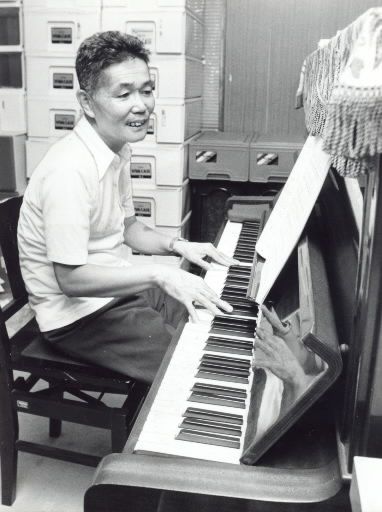The "Moral Adoption" of Hiroshima’s A-bomb Orphans, Part II [4]
Feb. 1, 2009
Good fortune makes the Cousins his moral parents
by Akira Tashiro and Masami Nishimoto, Special Reporters
This series of articles continues the story of the "moral adoption" of children in Hiroshima by American citizens. It was originally published in July 1988. The exact spelling of some names could not be confirmed.
When the mood strikes, he sits down at the piano. "Playing the piano relaxes me," he explained. "I learned to cherish this time from my American parents."
The moral parents of Teruaki Shimoguchi, 52, an employee of the Japanese Central Union of Agricultural Cooperatives and a resident of Asakita Ward, Hiroshima, are Norman Cousins, 73, the architect of the moral adoption campaign, and his wife Eleanor, 74. When Mr. Cousins visited Hiroshima for the third time in September 1953, Mr. Cousins and Mr. Shimoguchi formed a connection as moral parent and adopted child. At the time, Mr. Cousins was the editor-in-chief of the Saturday Review of Literature and Mr. Shimoguchi was a first-year student at Hiroshima Music High School. Mr. and Mrs. Cousins are Mr. Shimoguchi's second set of moral parents, succeeding the boy's first moral parents of about two years and bringing to his life an unexpected blessing.
Mr. and Mrs. Cousins offered to send 30 dollars a month, about 10,800 yen at the time, to Mr. Shimoguchi. In those days, university-educated government employees received hardly more than 8,000 yen a month as a starting salary. While children at the Hiroshima War Orphans Foster Home graduated from junior high school and entered the workforce one after the other, Mr. Shimoguchi felt confused, but delighted, by his good fortune.
"I felt guilty because the other kids had to work and study while I could happily spend time on music, my favorite subject," he said. The following spring, Mr. Cousins recommended that his adopted son move to Tokyo to study music and English. This fostered Mr. Shimoguchi's dream of becoming a member of the Cousins family and studying music and English in New York. The boy accepted his moral father's proposal as "a step toward leaving for the United States."
In April 1954, Mr. Shimoguchi left Hiroshima Music High School and the Hiroshima War Orphans Foster Home, his home for seven years, and moved to Tokyo. As a result of the atomic bombing, Mr. Shimoguchi had lost the six members of his family, including his parents. Before entering the home, he managed to survive for about two years after the war ended by working as a shoeshine boy at a black market in front of Hiroshima Station. In those days, he felt he "couldn't endure, thinking about tomorrow," but now, in April of 1954, he was "filled with hope for the future." In the rattling car of the overnight train, he was alive with joy.
Mr. and Mrs. Cousins had chosen Mr. Shimoguchi as their adopted child when they spotted his aptitude for the piano and felt he could adjust to life in the United States. But the boy's efforts soon hit a wall. "I was learning the piano and English from Americans," he explained. "But, honestly speaking, I wasn't making the sort of progress I wanted. I felt I had reached the limits of my ability."
After living in Tokyo for a year and a half, Mr. Shimoguchi gave up his dream of departing for the United States and he returned to Hiroshima. He suffered this setback at the age of 19. But Mr. Cousins continued to encourage the boy: "We've upset your life through our meddling. Still, you should keep up your studies. You can always play the piano as a hobby, like me. I'm sure it will enrich your life."
Following his moral father's advice, the boy re-entered high school, then went on to university and studied sociology. Meanwhile, he continued to play the piano. At the age of 26, when he was a sophomore in college, he married Ai, now 50, a woman he first met in high school. After graduating from university in 1965, he began working at a child welfare facility in the city of Kure in Hiroshima Prefecture. At that point, Mr. Shimoguchi told his moral parents to "stop sending money as I can now support myself."
Mr. Shimoguchi received support from the Cousins over a period of 12 years. Now working for a local agricultural cooperative, he remarked, "Even if I thought about doing something to repay their kindness, they've already been recognized for their good works. The best I can do, I think, is to make a happy home for my family and contribute something, even in a small way, to help the world."
Mr. Shimoguchi no longer is in touch with the Cousins on a regular basis. But when Mr. Cousins visits Hiroshima, the two always meet. "When we see each other, we feel a connection right away," Mr. Shimoguchi said. He still shares a common interest with his moral father. "Mr. Cousins is over 70 now, but he still plays the piano. I hope I can continue playing the piano, too, no matter how old I am."
(Originally published on July 27, 1988)








